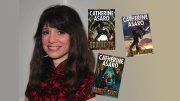Most of the contenders to succeed Bill Clinton as president sported a Harvard connection (see "The Crimson Party," November-December 2000, page 120). Fittingly, once the November 7 election returns segued into the long count in the Sunshine State, the legal teams and other analysts involved were distinctly Cantabrigian, too.
Laurence H. Tribe, Tyler professor of constitutional law, showed up on the New York Times op-ed page on Sunday, November 12, urging that the country "Let the Courts Decide," and then appeared in Florida on Monday to defend against the Bush campaign's challenge to hand recounting of votes. His Law School colleague Alan M. Dershowitz, Frankfurter professor of law, represented Palm Beach County voters who argued they were being disenfranchised.
The same day, still another law-school faculty member, Einer R. Elhauge, editorialized in the Wall Street Journal that "Florida's Vote Wasn't 'Irregular,'" while further down the page, economics professor Edward L. Glaeser argued "Recount 'Em All, or None At All." A week later, Elhauge showed up in the Times, supporting the Bush case for federal jurisdiction over lawsuits. By the time that the U.S. Supreme Court became involved, Florida legislators had retained former U.S. solicitor general Charles Fried, now Beneficial professor of law, to argue their case (opposing Tribe) and Elhauge was urging the legislature to vote in their own panel of electors for the Electoral College formalities. With election litigation outpacing tourism as Florida's chief industry, no doubt many more Harvard lawyers had a hand in the action.
Jasjeet S. Sekhon, assistant professor of government, beat all the bigger guns into print. Using the Internet, he and four academic collaborators from Cornell and Northwestern published on November 11 a 16-page statistical analysis of "Voting Irregularities in Palm Beach County" (https://elections.fas.harvard.edu/). Drawing on returns from 4,481 "reporting units," from 46 states, and using computational resources they have developed at Harvard's Center for Basic Research in the Social Sciences, the scholars concluded that among units with more than 25,000 votes, "Palm Beach is the most irregular" in terms of showing "exceptionally high support for [Patrick] Buchanan that deviates from the expected level." With pages of formulae, tests of their data, and caveats about its limitations, the authors came to the "reasonably robust" finding that "Liberal precincts within Palm Beach County tended to have higher proportions of ballots that were not counted for the Presidential election either because no holes were punched or multiple holes were punched."
The consequences of that research, of course, remain to be determined not by Harvard social scientists or lawyers, but by future denizens of the history department. They may want to add as a footnote that Katherine Harris, the Republican secretary of state at the eye of this hurricane, in 1997 picked up an M.P.A. from the Kennedy School of Government. "





